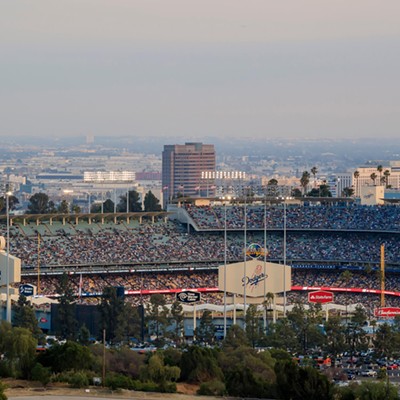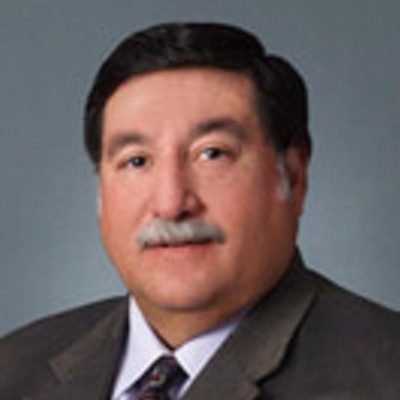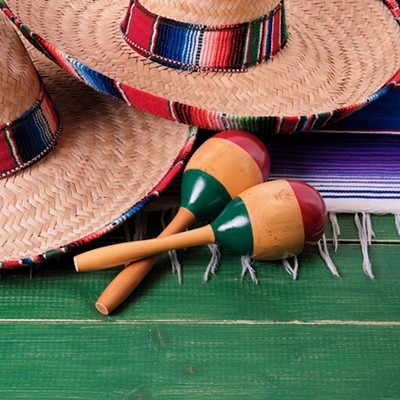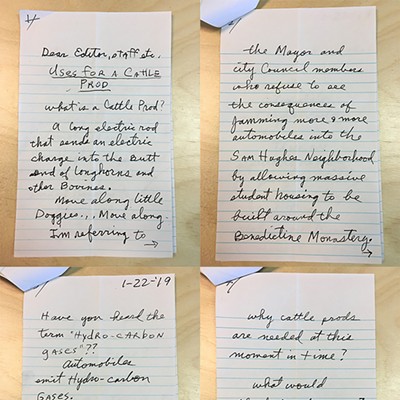When I was growing up, just about everybody had a nickname. Some were really creative; some were generic, and many were blatantly racist. My best friend, Fred, was a light-skinned African-American gentleman who was known to all as "Nippy." I'll leave it to all you would-be etymologists to determine the origin of that moniker. Alfredo was called "Humphrey" because of his resemblance to a cartoon character with that name. My friend, Gary Matthews, who is now the first-base coach of the Chicago Cubs, had several nicknames, none of which I can repeat and all of which referred to his skin color, which was considerably darker than Nippy's.
The period in which I grew up was the Golden Era of derogatory nicknames, especially for the unfortunate Caucasian, such as me. Mostly, my friends called me "Devil," short for "Blue-Eyed Devil," even though my eyes are green.
The term "Blue-Eyed Devil" is generally attributed to Malcolm X, but some claim that Student Nonviolent Coordinating Committee leader Stokely Carmichael first said it. Carmichael, whose racially charged rhetoric certainly amped things up in the late '60s, is also the inspiration for the Richard Pryor-penned, Cleavon Little-delivered line in Blazing Saddles: "Hey, where da white women at?"
We had about 15 guys who would hang out and play ball all the time. There was Junebug (yet another derogatory racial reference), Big Smut (for his taste in reading material) and Meat Hunter. That last guy was hilarious. One of 13 kids, his mom would give him money to go to the store to buy milk and bread for the family, and he'd buy meat, take it home, cook it and eat it all himself.
A guy who lived next door to me for a while in the projects was Bobby Chacon, who would go on to become the featherweight boxing champion of the world. Of all my friends who managed to live into adulthood, his is the story with the highest highs and the most tragically low lows.
Bobby couldn't have weighed more than 125 pounds in high school, but he was the one guy who absolutely no one messed with. He was completely nuts, but in a generally entertaining way. I nicknamed him "Juan Corona's Meaner Brother." (Juan Corona was, for a time, America's biggest serial killer. He was in charge of migrant workers in some tomato fields. He would hire people, have them work for a few weeks, then kill them, keep their wages and bury the bodies in the fields. Part of the reason he got caught was that the tomatoes were growing abnormally large. True story.)
Anyway, Bobby was a good baseball and football player, but he got into boxing and took to it immediately. He won a bunch of amateur fights and turned pro right after high school. He used to fight at the legendary Olympic Auditorium in Downtown L.A. He originally fought under the name "Schoolboy" Bobby Chacon. One of his cheesy managers thought it would sell a few extra tickets if they had Bobby take a couple of college courses at CSU-Northridge.
He won the world championship in 1975, and then the rollercoaster ride began. He started partying and spending lots of money. He lost titles and won them back. He had a brutal four-fight rivalry with Bazooka (now there's a nickname!) Limon. I'd see Bobby every now and then and ask him how Juan was doing.
In 1982, after he had won and lost several titles (and several million dollars), his wife, Valerie, begged him to quit and move with her to Hawaii. At 30, he felt he was in his boxing prime and declined the offer. So she grabbed a rifle and shot and killed herself. His next big fight was with world lightweight champion Cornelius Boza-Edwards of Uganda. Boza-Edwards, who was several inches taller than Bobby, had won a bloody battle with Bobby a couple years earlier. This time, Bobby grabbed the announcer's microphone and dedicated the fight to Val. Despite being knocked down early in the first round and again later in the fight, Bobby got off the canvas and won a close decision in what The Ring magazine called 1983's Fight of the Year.
After that, it was all downhill. He continued to fight with some success. By the early 1990s, he was out of boxing. He had lost his house and his classic car collection. He had several run-ins with the law. His son, Robert, was killed in gang violence in the very same projects in which Bobby and I had grown up. Just a few years ago, the Los Angeles Times ran an article about how Bobby had slipped into boxer's dementia and, most of the time, he doesn't even know who he is.
I sometimes wonder if he remembers Juan Corona.










